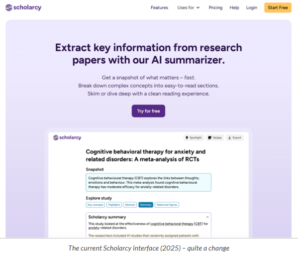Guest post by Michael Upshall, reposted with his permission.
Phil Gooch, founder of the successful startup Scholarcy, was the highlight of the first-ever AI, Publishing and EdTech Meetup (London, February 2025). Each of the four speakers was allotted 15 minutes, and Phil’s talk was the only one not to include any slides and the only one that was, as he mentioned, a real story. Scholarcy, founded by him and Emma Warren-Jones in 2018, was sold in 2024 to Texthelp, a leading provider of scholarly support tools for higher education. It was, and is, one of the best tools to make use of AI to assist the scholarly research process.


Roughly restated (this was not an event for detailed notes), his nine principles are:
- Something you care about. If you are going to spend all your waking hours on a new business, make sure it is something you really care about. In Phil’s case, it arose from his own PhD study, looking for a better way to summarize and to manage his literature review, rather than using highlighters and PDFs.
- Find a cofounder, with complementary skills. Phil could build tools; Emma could do marketing.
- Be prepared to pivot. Scholarcy’s initial market was selling services to publishers, but this was not sustainable. They switched to selling direct to users, and, fortunately, they had already built an engine, so they only needed a front end. Their second, and equally big pivot, was the discovery that the tools they provide for any student or researcher were equally beneficial for neurodivergent learners, which meant they were able to sell their product in markets where some funding was available.
- Be frugal at the start. They were fortunate to get a small investment, but this was not one of those startups that raises £20m and then burns the lot. In their first year, their total income was £140 – fortunately, the founders were working part-time at this point.
- Create a team. You need a team, and the best recruits are people who come to you. A would-be designer presented them with an entire site redesign, free of charge, and they offered him a job.
- Branding. The next step was to integrate the website and marketing initiatives in a single theme.
- Automation. Make sure you automate your process as soon as possible.
- Organic growth (this applies to a B2C company). They found an SEO guru to get them to the top of the search rankings, and identified new would-be influencers who were mentioning the product without payment.
- Spread the risk. For some years the whole operation was run from a card payment account, rather than a business bank account, which meant the entire business ground to a halt when they once became overdrawn.
Phil gave a remarkably frank and engaging presentation of what it was like to create and to grow a startup – right up to the moment of his heart attack, while he was training for what sounds like a crazy bicycle hill-climbing challenge. Fortunately, he has now fully recovered, but I can’t help feeling that this might be a 10th principle: however exciting the job, don’t overdo it.



